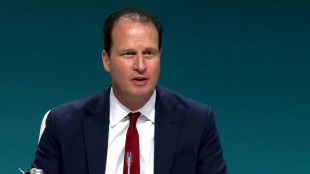
-
 Hong Kong political freedoms in spotlight during bumper trial week
Hong Kong political freedoms in spotlight during bumper trial week
-
Debt-saddled Laos struggles to tame rampant inflation

-
 Senna, Schumacher... Beganovic? Macau GP showcases future F1 stars
Senna, Schumacher... Beganovic? Macau GP showcases future F1 stars
-
India's vinyl revival finds its groove

-
 G20 tests Brazil's clout in Lula 3.0 era
G20 tests Brazil's clout in Lula 3.0 era
-
Over 20,000 displaced by gang violence in Haiti: UN agency

-
 Famed gymastics coach Bela Karolyi dies
Famed gymastics coach Bela Karolyi dies
-
'Break taboos': Josep Borrell wraps up time as EU's top diplomat

-
 Climate finance can be hard sell, says aide to banks and PMs
Climate finance can be hard sell, says aide to banks and PMs
-
Trump revives 'peace through strength,' but meaning up to debate

-
 New York auction records expected for a Magritte... and a banana
New York auction records expected for a Magritte... and a banana
-
Egypt's middle class cuts costs as IMF-backed reforms take hold

-
 Beirut businesses struggle to stay afloat under Israeli raids
Beirut businesses struggle to stay afloat under Israeli raids
-
Dupont lauds France 'pragmatism' in tight New Zealand win

-
 Swiatek leads Poland into maiden BJK Cup semi-final
Swiatek leads Poland into maiden BJK Cup semi-final
-
West Indies restore pride with high-scoring win over England

-
 Hull clings to one-shot lead over Korda, Zhang at LPGA Annika
Hull clings to one-shot lead over Korda, Zhang at LPGA Annika
-
Xi tells Biden ready for 'smooth transition' to Trump

-
 Trump nominates fracking magnate and climate skeptic as energy secretary
Trump nominates fracking magnate and climate skeptic as energy secretary
-
Tyson says 'no regrets' over loss for fighting 'one last time'

-
 Springboks' Erasmus hails 'special' Kolbe after England try double
Springboks' Erasmus hails 'special' Kolbe after England try double
-
France edge out New Zealand in Test thriller

-
 Netherlands into Nations League quarter-finals as Germany hit seven
Netherlands into Nations League quarter-finals as Germany hit seven
-
Venezuela to free 225 detained in post-election unrest: source

-
 Late Guirassy goal boosts Guinea in AFCON qualifying
Late Guirassy goal boosts Guinea in AFCON qualifying
-
Dominant Sinner cruises into ATP Finals title decider with Fritz

-
 Dinosaur skeleton fetches 6 million euros in Paris sale
Dinosaur skeleton fetches 6 million euros in Paris sale
-
Netherlands-Hungary Nations League match interrupted by medical emergency

-
 Kolbe at the double as South Africa condemn England to fresh defeat
Kolbe at the double as South Africa condemn England to fresh defeat
-
Kolbe at the double as South Africa beat England 29-20

-
 'If I don't feel ready, I won't play singles,' says Nadal ahead of Davis Cup farewell
'If I don't feel ready, I won't play singles,' says Nadal ahead of Davis Cup farewell
-
Fifth of dengue cases due to climate change: researchers

-
 Trump's Republican allies tread lightly on Paris pact at COP29
Trump's Republican allies tread lightly on Paris pact at COP29
-
Protesters hold pro-Palestinian march in Rio ahead of G20

-
 Graham equals record as nine-try Scotland see off dogged Portugal
Graham equals record as nine-try Scotland see off dogged Portugal
-
China's Xi urges APEC unity in face of 'protectionism'

-
 Japan's Kagiyama, Yoshida sweep gold in Finland GP
Japan's Kagiyama, Yoshida sweep gold in Finland GP
-
Macron to press Milei on climate action, multilateralism in Argentina talks

-
 Fritz battles past Zverev to reach ATP Finals title decider
Fritz battles past Zverev to reach ATP Finals title decider
-
Xi, Biden to meet as Trump return looms

-
 Kane warns England must protect team culture under new boss
Kane warns England must protect team culture under new boss
-
Italy beat Japan to reach BJK Cup semi-finals

-
 Farmers target PM Starmer in protest against new UK tax rules
Farmers target PM Starmer in protest against new UK tax rules
-
Italy's Donnarumma thankful for Mbappe absence in France showdown

-
 McIlroy in three-way tie for Dubai lead
McIlroy in three-way tie for Dubai lead
-
Bagnaia wins Barcelona MotoGP sprint to take season to final race

-
 Shiffrin wins Levi slalom for 98th World Cup victory
Shiffrin wins Levi slalom for 98th World Cup victory
-
Israel pummels south Beirut as Lebanon mulls truce plan

-
 Religious Jews comfort hostages' families in Tel Aviv
Religious Jews comfort hostages' families in Tel Aviv
-
German Greens' Robert Habeck to lead bruised party into elections


Trump revives 'peace through strength,' but meaning up to debate
Donald Trump says he will bring "peace through strength," reviving a time-tested phrase, but whether he is pursuing a strategy or just relying on a catchphrase is a matter of dispute.
In invoking "peace through strength," the incoming president appears to be likening himself to Ronald Reagan, who sharply raised military spending before negotiating, late in his 1981-89 presidency, with a newly reform-minded Soviet Union.
Henry Kissinger, the apostle of the cool-minded pursuit of national interests known as realpolitik, had also spoken of "peace through strength" but the idea has much deeper roots.
The fourth-century AD Roman military strategist Vegetius famously wrote, "If you want peace, prepare for war," and before him the Roman emperor Hadrian sought stability by building defensive walls.
Trump, who has both vowed a strong military and to end or avoid wars, promised "peace through strength" in announcements of several key nominees, with Secretary of State-designate Marco Rubio also using the phrase.
Since Trump's victory, "peace through strength" has quickly been embraced in statements by Ukraine -- but with a very different subtext.
Trump has vowed quickly to end the war started with Russia's invasion, with his aides suggesting leveraging US military support to Kyiv -- which totals $60 billion under President Joe Biden -- to force compromise.
President Volodymyr Zelensky, in a speech two days after the US election, said forcing concessions would be "unacceptable."
"The concept of 'peace through strength' has proven its realism and effectiveness more than once. Now, it is needed once more," Zelensky said.
- Eye on China -
Trump has not expanded in depth on what he means.
But Robert O'Brien, a national security advisor to Trump in his first term, in a pre-election essay said it would mean treating China head-on as an adversary.
Writing in Foreign Affairs, O'Brien called for rapid military build-ups across Asia including deploying the entire US Marine Corps to the Pacific.
But O'Brien said that Trump, despite "false portrayals," was a "peacemaker," pointing to his encouragement of Arab normalization with Israel and to his deal with Afghanistan's Taliban that eliminated deaths of US troops.
Biden carried out the deal and withdrew the US military six months into his term, leading the Taliban to return to power swiftly after 20 years.
- 'More than a buzzword' -
"Peace through strength" has a clear domestic appeal, with few voters likely either to say they reject peace or prefer weakness.
But George Beebe, a former CIA analyst, said that while it was unclear how the Trump team would act, "I think this is probably more than just a buzzword."
"My strong impression is that they are serious about using this concept as a guide," said Beebe, director of the grand strategy program at the Quincy Institute for Responsible Statecraft, which favors military restraint.
In the perception of the Trump team, "peace through strength" also likely means less focus on Biden's Pentagon internal priorities, such as increasing diversity, and just "having a capable war-fighting machine," Beebe said.
But Beebe said there needed to be a balance, noting that Reagan combined his military build-up with "smart diplomacy" to promote peace and stability with the Soviets.
"If you veer too far in the direction of extending an olive branch, that can be potentially abused by adversaries," Beebe said.
"On the other hand, if you veer too much in the warrior direction, you can end up with not peace through strength, but war through strength."
Jacob Stokes, a senior fellow at the Center for a New American Security, said "peace through strength" can play out differently in theory and practice.
Even if Trump builds the military, Stokes said, the United States would lose a key advantage if he again questions US allies in Europe and Asia.
And cutting off military aid to Ukraine "might get you the peace part, but not necessarily the strength part," Stokes said.
"The pitfall is that you assume that more strength -- and more demonstrations of it, and willingness to use it perhaps even in irrational ways -- necessarily means more peace. International politics is more complicated than that," he said.
"It's a great political slogan for President Trump. The challenge of translating that effectively into a foreign policy will be a substantial and quite difficult one."
Ferreira--PC
